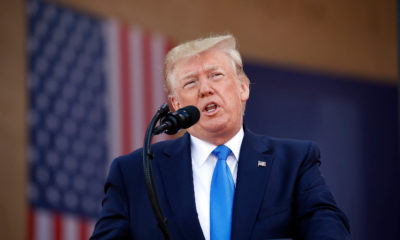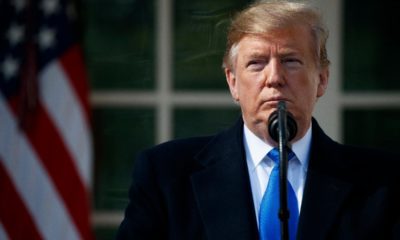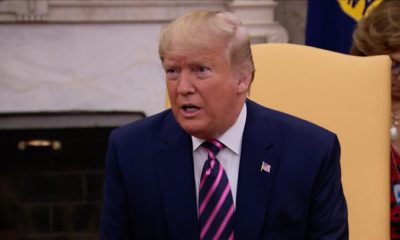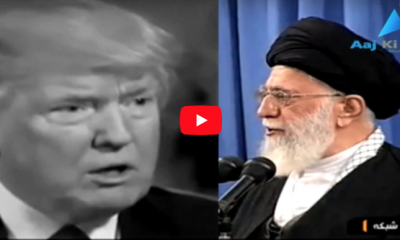World
Trump doesn’t know much about foreign policy:Obama

 Washington:US President Barack Obama said Donald Trump’s suggestion that Japan and South Korea should consider obtaining nuclear weapons demonstrates the Republican presidential front-runner’s lack of understanding about foreign policy.
Washington:US President Barack Obama said Donald Trump’s suggestion that Japan and South Korea should consider obtaining nuclear weapons demonstrates the Republican presidential front-runner’s lack of understanding about foreign policy.
“The person who made the statements doesn’t know much about foreign policy or nuclear policy or the Korean Peninsula or the world generally,” Obama said at a news conference on Friday during the closing of the two-day Nuclear Security Summit, here.
Obama described the US nuclear umbrella for Japan and South Korea, in place of their own arsenals, as “one of the cornerstones of our presence in the Asia Pacific,” which has provided the US peace, prosperity and flowing commerce, CNN reported.
“It has prevented the possibilities of a nuclear escalation and conflict,” he said, adding “You don’t mess with that. It’s an investment that rests on the sacrifices that our men and women made” in the Second World War.
“We don’t want someone in the Oval Office who doesn’t recognize how important that is,” Obama added.
The summit came as the Republican front-runner to replace Obama in the White House made several controversial nuclear proposals this week.
Trump said that nuclear proliferation is the world’s biggest challenge, but also suggested at a CNN town hall on Tuesday that it may be time for Japan and South Korea to develop their own nuclear arsenals so the US can pull back from Asia.
Trump has also suggested re-drawing US security relationships in other regions, arguing that Germany and Saudi Arabia need to do more in their own defence or pay the US more for the protection it offers.
The summit, the final of four Obama has held during his presidency since 2010, drew over 50 leaders from around the world to discuss ways to prevent the use of nuclear weapons and better secure nuclear materials, especially from the threat of nuclear terrorism.
Obama said global efforts to improve nuclear security have removed from circulation material that is equivalent to 150 nuclear weapons, safeguarding it from extremists.
At the opening of the nuclear conference’s Friday session, Obama said the summit’s work — mostly done quietly behind the scenes in the months between high profile gatherings — served the crucial purpose of reducing the chances that nuclear materials could be stolen.
World
Lockdowns in China Force Urban Communities to Defy Censorship and Vent Frustration Online

Shanghai’s rich middle class is leading a wave of online dissent over the strict and prolonged lockdowns imposed in various parts of the country. Chinese internet censorship is struggling as patience is wearing thin in many urban centers, coming up with creative forms of online protests.
Social Media Posts Revealing Lockdown Tension in Shanghai
Drawn-out lockdowns are nothing new in China as authorities insist with the nation’s zero-Covid policy since the start of the pandemic. Currently over This time around, however, metropolitan areas like Shanghai are increasingly difficult to keep quiet, given that its more than 25 million residents have seen weeks of total isolation along with food shortages and many other service interruptions.
Dozens of towns and reportedly over 300 million Chinese citizens have been affected by lockdowns of different severity. As expected, urban netizens have been most outspoken over their difficulties by finding creative ways to get around state censorship and bans placed on topics, news comments and spontaneous campaigns.
Shanghai residents have been using mobile proxies and hijacking seemingly unrelated hashtags to talk about healthcare issues, delivery failures and the overall severity of their situation. The “positive energy” that the Chinese government wants to transmit during the recent prolonged series of lockdowns does not come naturally to those counting food supplies and online censors are working hard to filter words, trending topics and undesired social media sharing.
WeChat groups and message threads are under constant monitoring. Posts questioning the zero-Covid approach have been quickly deleted, including by leading Chinese health experts like Dr. Zhong Nanshan. Video footage is soon censored and protests and investigations are quickly made to disappear.
Where this has not worked, officials have exposed banners with warnings and outright threats like “watch your own mouth or face punishment”, while drones have been patrolling the city skies. Yet, if anything, this has led to further tensions and unspoken confrontation with Shanghai’s educated and affluent middle class.
Creative Online Solutions Harnessing Civic Energy
Announcements by Chinese social media that they would be publishing the IP addresses of users who “spread rumors” have not helped either. Tech industry research has shown that much of Asia’s tech-savvy population has a habit of using mobile proxies and other privacy tools, quickly finding workarounds to browse the internet freely and talk to the world about the hottest topics.
The sheer volume of forbidden posts is already a challenge for the very censorship system, experts explain. Unable to track all trending hashtags, state workers overlook topics that speak about the US, Ukraine or other popular news. Linking human rights elsewhere to their situation, Chinese online dissidents establish their informal channels and “hijack” the conversation to share personal or publicly relevant information about the Covid suppression in their town.
Sarcastic and satirical posts still dominate. Others hope to evade the censors by replacing words from famous poems or the national anthem. One thing is certain – social media, when harnessed with the right creativity, has proven its ability to mount pressure on the government in even some of the most strictly controlled tech environments like China.























